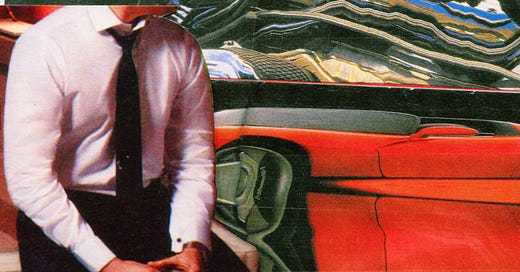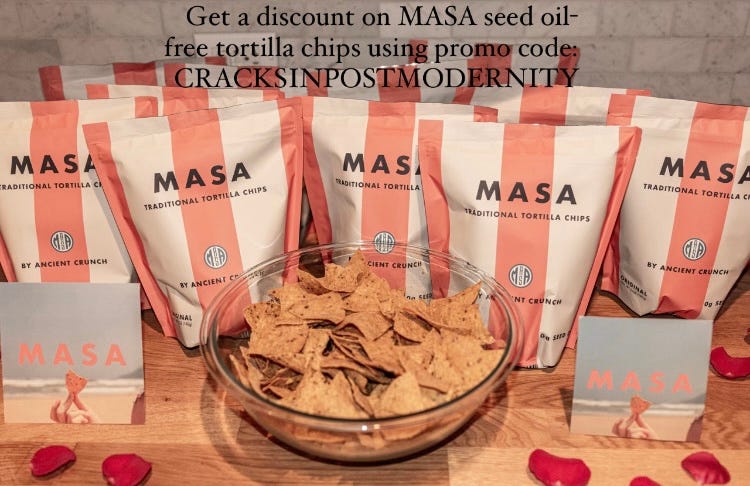"[Don't] Call Me Daddy": Manosphere influencers are not your father
"by their fruits ye shall know them"
When I was 20 years old, I took an undergraduate course on Friedrich Nietzsche. The way he effortlessly and with humor tore down all of Western philosophy profoundly inspired me. I was particularly fond of his criticism of Christianity, which resonated with me: I had hated Christianity because I believed it was unscientific, and restricted people’s freedom. Nietzsche asserted that Christianity was also a religion of weakness—a slave religion—which glorified the lowest among us and demonized the strong. So not only was I too smart for Christianity, I was also too strong and too powerful. I imagined myself being like Nietzsche, living in the mountains and looking down upon the mist as I wrote my treatises on ultimate reality. I fancied him to be a good role model.
I explained all of this to my bewildered father, as we smoked tobacco pipes in my childhood front yard. He was confused by my enthusiastic rant, and completely unimpressed by my adolescent wisdom. He raised an eyebrow and shook his head. “Didn’t Nee-Chee go insane from STDs and die all alone? Does that sound like a happy life to you?” He went on to quote the Scriptures: “By their fruits, ye shall know them.” Although he has never made fun of me for my pretentious cringe phase, I have never forgotten this conversation. Deo gratias, for it gave me a frame for understanding the nature of a true role model and prevented further embarrassment. Though Nietzsche remained close to my heart, I no longer wanted to be like him.
Join us tonight 1/29 at 7 pm at Maryhouse for Holy Lit! To celebrate, we are offering a limited time 20% discount on subscriptions. Click here to redeem.
Philosophers make crummy role models. With few exceptions (mostly ancient Greeks, whose lives are more like myths than facts), philosophers are usually reclusive, socially awkward men. They rarely maintain a marriage or long term relationship. They cling to petty grudges against enemies (or unrequited love interests) until their death beds, and when they get an ounce of fame or wealth they are just as likely as anyone else to plunge into a world of excess and vice. If you were to imitate the lives of the greatest modern philosophers, from Kant to Nietzsche to Sartre, you would die lonely, bitter, and full of regrets, just like them.
In a world of broken marriages and fatherless homes, young men often seek out father figures to fill in the role that their deadbeat dads left open. It is increasingly easy to retreat from the physical world and people around you into a hyper-reality of curated social media algorithms, which are ruled by influencers. Though they hardly stack up to Nietzsche, today’s “philosophers” are social media superstars. A young man may find inspiration in the quotable sayings of Jordan Peterson about what it means to be a good man, or feel empowered when Andrew Tate tells them not to care about what women think. He’ll wake up at 4:30 am to work out, and choke down some raw liver for breakfast before taking a cold shower (to increase testosterone!).
These “philosophers” give explanations to young men for why their lives have not turned out the way they could have, and then offer solutions. “You are exactly where you deserve to be. Change who you are and you will change how you live,” says Tate. He promotes a kind of prosperity Gospel, in which you think relentlessly positive thoughts about your goals and do anything to achieve them. Not all of his advice is bad—he advises young men to take responsibility for their own problems and to keep trying even when things get difficult. “The temporary satisfaction of quitting is outweighed by the eternal suffering of being a nobody.” Tate happily tells his followers that your worldly goods determine your value. “I have everything every man has ever dreamed of. I got a big mansion, I got super cars, I can live anywhere I want, I got unlimited women, I go where I want; I do anything I want all the time. So, I’m an amazing role model.” This is contrary to most traditional wisdom, religious or otherwise, which encourages detachment from these things. “Money will fix all your problems. If money was so bad and did not bring happiness, all the billionaires would be giving it away. Wake up.” Anyone looking up to Tate as a role model should ask himself if he really believes this.
Like many masculinity gurus, Tate has a rather unorthodox relationship with women. “Females are the ultimate status symbol. People think I’m running around with these hoes because I like sex. That’s nothing to do with the reason why I’m running around with these bitches. I got these bitches just so everyone knows who the don is.” Tate believes that women ought to be pure to be worthy of a man, but men are under no such obligation. “Men can cheat, women can’t.” “Why would you be with a woman who's not a virgin anyway [sic]? She is used goods. Second hand.” These common manosphere sentiments are empowering for young men who have been acting like “nice guys” and have perhaps treated women as a false idol, inhuman and too perfect to truly love. But they will not lead to the loving, happy marriage that most incels want deep down. Putting aside his impending trial for human trafficking and rape, is this the advice a loving father would give his son when seeking out a bride? Would a loving husband ever talk about his wife this way?
Jordan Peterson offers a more levelheaded approach to the same problems.
But if a philosopher (using the term loosely with regard to Tate) is a poor role model, he is even more deficient as a father figure. When a young man makes a father figure out of a social media star, he forms a parasocial relationship. He clicks “like” and leaves comments on his “dad’s” posts, as if he is having a conversation with his own father. He defends his idol against naysayers. He posts motivational quotes or videos and internalizes them as great life advice. He buys the shirts, the books, the posters, the Jocko Fuel, the liver tablets, and signs up for Hustler’s University. But for all of this work (which he does for free), he does not receive a single cent. Worse yet, he doesn’t receive the one thing that a boy truly needs from his father: love.
A real father figure, even if he isn’t a great model of behavior, can do something that an online masculinity guru can never do: he can love his son. Dr. Peterson, Mr. Tate, and The Liver King can never love the young man who looks up to them. They don’t even know who he is. If they did, at best they could treat him as a salesman treats his valued customer. Their adoring followers, their surrogate sons, are a marketing niche.
Love, the missing piece, is the most important thing a father figure can give and overshadows any other great skill or knowledge that he may possess. For a father who loves his children is able to become the role model that they need, because his love for them drives him to do things that he would not or could not do otherwise. A loving father will sacrifice his own desires for the good of his family, and will ask himself “what would my children think?” when choosing his course of action. Love includes the imperative to firmly correct those to whom one’s care is entrusted–never out of spite, anger, or pride–but out of an unwavering desire for the child’s good.
A social media star need only ask “how popular will this post be?” or “how can this serve to further the image I have created of myself?” In other words, a real father gives up himself, while a social media guru is primarily concerned with himself by necessity. Perhaps it is the case that these gurus feel some sense of concern for these young men…maybe they aren’t purely seeking to capitalize on their father wounds. Even so, they are not a replacement for a real father figure who can know, love, correct, and teach a child in the flesh.
I am a very fortunate man in that I have a great father. He is no philosopher, he doesn’t drive a Bugatti, and he does not have giant muscles or rippling abs. Yet somehow all of the masculine superstars of our day pale in comparison to him, for me. When I first heard Jordan Peterson’s famous “sort yourself out” speech, my first thought was “my dad wouldn’t like this guy,” because my father has an automatic distrust of philosophy (for him, the Bible is enough). When I heard Andrew Tate bragging about his sex life and luxury cars, I knew that my dad would think he was crude and vain.
My father worked long hours to support a family of 8. He talked to me about important subjects like faith and right living (and still does), and I have never seen him do or say a cruel thing to another person in my entire life. But most importantly, my dad loves me, and has told me so almost every day of my life. It was my father’s love that did more to make me into a man than anything else in this world. Every book I read, every speech I listened to, every other role model I tried to mimic was only helpful insofar as it built on that foundation.
In this world of broken families and absent fathers, many young men do not have the love of their biological father. This absolute tragedy has driven these men to lives of pain and suffering and loneliness, and has fattened the wallets of so many vultures who use their pain as a sales funnel. For those young men who do not have a relationship with their biological father, the only real solution is to seek out love, and to allow themselves to be loved in return. It might be from a mentor in a job or at school, or from the father of a good friend, or from a pastor or priest or imam. The great postmodern temptation to close yourself off to the human realities in front of you will only lead to despair. The entire despicable trend can be reversed by simply getting together with people, in a physical location, and choosing to exist in that reality instead.
Joe Enabnit is a gym owner, useless degree holder, rural r-word, kaffeost enjoyer, and Iowa supremacist. Twitter:@barbell_saint IG: @saintmichaelbarbell
Check out Joe’s piece Archetyping at the Gym, originally published in cracks in pomo: the zine, and Joe’s appearance on Cracks in PoMo the pod here. Also check out our pieces There is Something Queer About Andrew Tate, Jordan Peterson vs. St. Joseph, Nietzsche and the Culture Wars, and The Angst of the Male Thirst Trapper.
Graphic by Patrick Keohane @revolvingstyle
Please consider signing up for a paid subscription to this page for more riveting content. If you’re new to Cracks in Pomo, check out the About page or read up on our Essentials. Also check out our podcast on Spotify, Apple, and YouTube and follow us on Instagram and Twitter.
MASA tortilla chips by Ancient Crunch is offering our followers 10% off their order with the promo code CRACKSINPOSTMODERNITY. Click here to redeem.








Wonderful